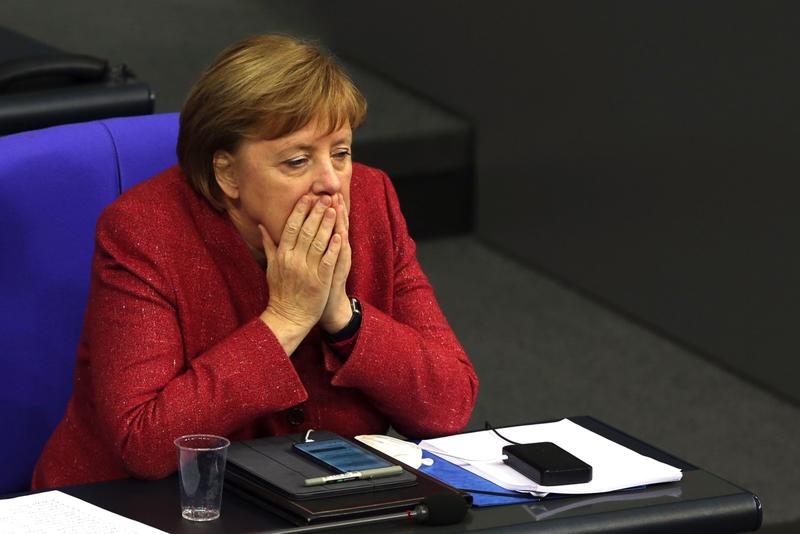 German Chancellor Angela Merkel reacts during a budget debate in the Bundestag in Berlin, Germany, on Dec 9, 2020. (PHOTO / BLOOMBERG)
German Chancellor Angela Merkel reacts during a budget debate in the Bundestag in Berlin, Germany, on Dec 9, 2020. (PHOTO / BLOOMBERG)
Support for German Chancellor Angela Merkel’s conservative bloc slumped to its lowest in a year as discontent over the government’s handling of the vaccination rollout mounts and some opposition leaders called for her to fire the health minister.
The stuttering pace of inoculation, irritation with months of lockdown restrictions and a scandal over allegations that some conservative lawmakers profited from the pandemic have eroded the CDU/CSU group’s backing, a Forsa opinion poll showed Wednesday. It followed the bloc’s poor showing in two regional votes on Sunday and suggests that it is losing steam ahead of September’s national election while the Greens gain momentum.
Backing for the CDU/CSU dropped by four percentage points compared with the previous week to 29 percent, the lowest since last March, according to a Forsa opinion poll
After climbing as high as 40 percent last spring, backing for the CDU/CSU dropped by four percentage points compared with the previous week to 29 percent, the lowest since last March, according to the poll for broadcaster RTL.
The Greens - who on Sunday strengthened their hold on power in Baden-Wuerttemberg and had the biggest increase in support in Rhineland-Palatinate - gained three points to 21 percent in second place, the highest since late November. The Social Democrats, the junior partners in Merkel’s government, remained at 16 percent in third.
ALSO READ: Merkel's CDU suffers record setback in state elections

The bad news for Merkel’s bloc comes as pressure on her to deal with Germany’s missteps in handling the pandemic mounts. Opposition leaders on Wednesday slammed Health Minister Jens Spahn for his decision to suspend use of AstraZeneca Plc’s COVID-19 vaccine amid concerns over its safety.
There was more evidence of the pandemic’s impact on Europe’s biggest economy Wednesday, as Merkel’s panel of advisers predicted weaker growth this year and warned the recovery could be jeopardized by a renewed spike in infections.
German output will expand by 3.1 percent in 2021, the panel predicted, trimming a forecast of 3.7 percent published in November. Next year, they expect growth to accelerate to 4 percent, underpinned by a pickup in consumer spending and strong demand for German exports, but warned that a “third wave” of infections is a significant threat.
Wolfgang Kubicki, deputy leader of the liberal FDP party, said replacing Spahn “would help to renew the population’s trust in the state” even if there are only a few months left until the election.
Spahn had been too late with the adoption of face masks and the government’s testing and vaccination strategy also failed, he said, adding that the minister “is not up to the job.”
Opposition leaders slammed Health Minister Jens Spahn for his decision to suspend use of AstraZeneca's COVID-19 vaccine amid concerns over its safety, saying Spahn has "further undermined trust in the vaccination strategy"
“With the uncoordinated and badly communicated suspension of AstraZeneca vaccinations, Spahn has further undermined trust in the vaccination strategy,” Katrin Goering-Eckardt, the Greens’ caucus co-chief, told the Funke media group.
A spokeswoman for the Health Ministry declined to comment.
Germany and other European states suspended the use of Astra shots amid reports of blood clots in some recipients, while the European Union’s drug regulator has repeatedly said its benefits outweigh the risks.
At the same time, the number of COVID-19 infections and deaths in Germany remains stubbornly high, prompting epidemiologists to say that the country has entered a “third wave” of the pandemic. That raises the prospect of a planned cautious lifting of restrictions being postponed and the current curbs extended into April.
Coronavirus cases in Germany rose the most in almost a week, and the country’s seven-day incidence rate per 100,000 people climbed to the highest in more than a month, data showed Wednesday.

The two state elections last Sunday gave voters a first opportunity to express their anger at the ballot box over Germany’s many problems in dealing with the pandemic. Conservative leaders vowed to step up their campaign to lead Germany’s next government after the CDU crashed to its worst-ever results in its former strongholds.
Evidence of rising voter dissatisfaction will pile more pressure on the Armin Laschet, the new leader of Merkel’s Christian Democratic Union, who is hoping to run as the conservative chancellor candidate to replace Merkel
If the election were held now, the conservatives and Greens would together command a majority of seats in the lower house of parliament, the poll indicated. Other potential coalitions - including the Greens, SPD and liberal Free Democrats, or the Greens, SPD and the far-left Die Linke - would fall short.
READ MORE: German liberals coy on kingmaker potential after state vote success
Laschet is hoping to run as the conservative chancellor candidate to replace Merkel after September’s national vote, but is relatively unpopular compared to his main rival for the nomination, Bavaria Premier Markus Soeder.
If German voters were able to elect their chancellor directly, 36 percent would choose Soeder, the Forsa poll showed. His potential challenger from the Greens, co-leader Robert Habeck, would score 20 percent and the SPD’s candidate, Finance Minister Olaf Scholz, 15 percent. If Laschet ran for the conservatives, he would only garner 21 percent, compare with 22 percent for Habeck and 20 percent for Scholz.
The Forsa poll of 2,501 people was conducted March 9-15 and has a margin of error of +/- 2.5 points.


